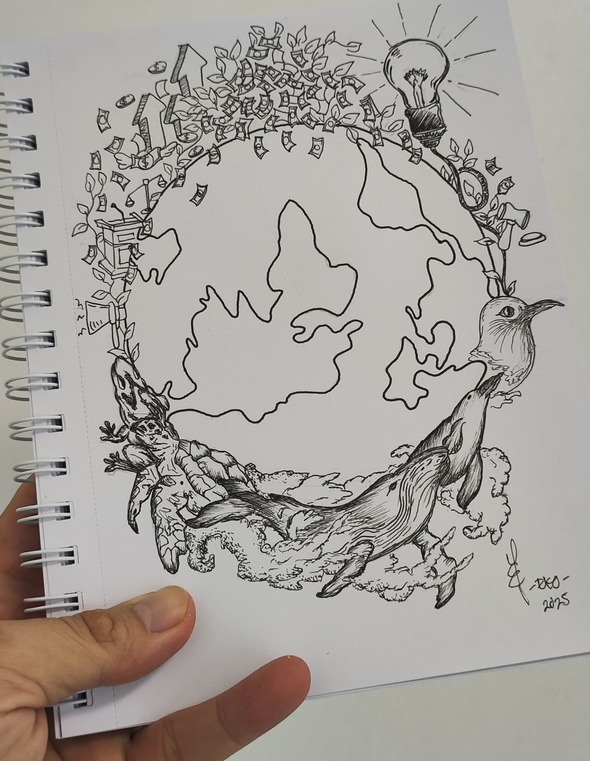
Submitted by Albina Mamedova on Wed, 23/04/2025 - 18:50
As our Masters in Conservation Leadership students enjoy their Easter break, we have a moment to reflect on the packed schedule and insights that shaped the Lent Term. This period marked the halfway point of their Cambridge journey, bringing both challenges and fresh perspectives as they tackled the "Leading the System" module.
One of our current students, Eko, captured the essence of this term's learning through an evocative sketch in his notebook. The artwork presents an inverted globe – challenging traditional perspectives of global north versus global south – surrounded by a complex system of elements. Money and economic factors dominate portions of the illustration, while wildlife appears to be pushed beyond Earth's boundaries. A lightbulb represents innovative thinking amidst these challenges.
"I flipped the globe to question our usual perspectives," Eko explains. "Some elements of nature are pushed outside our mother Earth, surrounded by economic and political systems with money-driven policies. Yet there's still hope through innovation. The question that remains for me is: where is the human element in this system? Where should I position myself?"
The students found the Lent Term flying by as they balanced "Leading the System" modules with ambitious group innovation projects. Days were intense but eye-opening as they explored the intricate challenges of modern conservation.
They wrestled with complex systems thinking, faced uncomfortable realities, and mapped out the web of connections between social, economic, and environmental factors. Yet within this complexity, they discovered creative potential—experimenting with fresh perspectives, alternative incentives, and innovative approaches.
The curriculum brought together diverse voices and perspectives, including:
- Systems thinking with Martin Sandbrook
- Explorations of green growth and degrowth economic models with Erik Gomez-Baggethun
- Conservation governance and policy with Howard Nelson and Peter Brotherton
- Advocacy training led by Lucy Bjorck and Ali Plummer
A particularly notable experience was the module on behavioural insights for conservation with Lucia Reisch and Arjun Kamdar, which examined how decision-making can be influenced at individual and systemic levels.
As our students prepare for their final term and upcoming placements scheduled for May through August, they carry forward these insights—better equipped to navigate complexity, spark innovation, and collaborate for meaningful change.
The placement period will offer them opportunities to apply their learning to carefully designed projects addressing real-world leadership challenges across the conservation sector. This practical application of their theoretical understanding will be the culmination of the detailed planning undertaken throughout the Michaelmas and Lent Terms.

